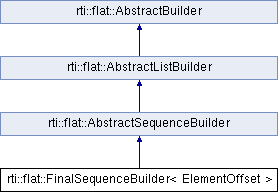Builds a sequence member of fixed-size elements. More...
#include <SequenceBuilders.hpp>

Public Member Functions | |
| ElementOffset | add_next () |
| Adds the next element. More... | |
| FinalSequenceBuilder & | add_n (unsigned int count) |
| Adds a number of elements at once. More... | |
| Offset | finish () |
| Finishes building the sequence. More... | |
 Public Member Functions inherited from rti::flat::AbstractBuilder Public Member Functions inherited from rti::flat::AbstractBuilder | |
| void | discard () |
| Discards a member in process of being built. More... | |
| bool | is_nested () const |
| Returns whether this is a member Builder. More... | |
| bool | is_valid () const |
| Whether this Builder is valid. More... | |
| rti::xcdr::length_t | capacity () const |
| Returns the total capacity in bytes. More... | |
Additional Inherited Members | |
 Protected Member Functions inherited from rti::flat::AbstractListBuilder Protected Member Functions inherited from rti::flat::AbstractListBuilder | |
| unsigned int | element_count () const |
| Returns the current number of elements that have been added. More... | |
 Protected Member Functions inherited from rti::flat::AbstractBuilder Protected Member Functions inherited from rti::flat::AbstractBuilder | |
| virtual | ~AbstractBuilder () |
| If this is a member Builder, it calls finish(). More... | |
Detailed Description
template<typename ElementOffset>
class rti::flat::FinalSequenceBuilder< ElementOffset >
Builds a sequence member of fixed-size elements.
- Template Parameters
-
ElementOffset The Offset type for the elements of the sequence
To add an element, call add_next() and use the ElementOffset it returns to initialize the element's values. An empty sequence can be built by calling finish() without any call to add_next().
This class doesn't enforce the sequence bound set in IDL.
The following example uses a FinalSequenceBuilder to initialize a sequence member of MyFlatMutableBuilder with two elements:
If the element type meets certain requirements, rti::flat::plain_cast() provides a more efficient way to initialize a sequence of final elements.
Member Function Documentation
◆ add_next()
|
inline |
Adds the next element.
- Returns
- The Offset that can be used to set the element values
◆ add_n()
|
inline |
Adds a number of elements at once.
This is an alternative to add_next().
To initialize the elements, call finish() and use the Offset it returns to access the elements.
◆ finish()
|
inline |
Finishes building the sequence.
- Returns
- An Offset to the member that has been built.
- See also
- discard()